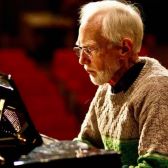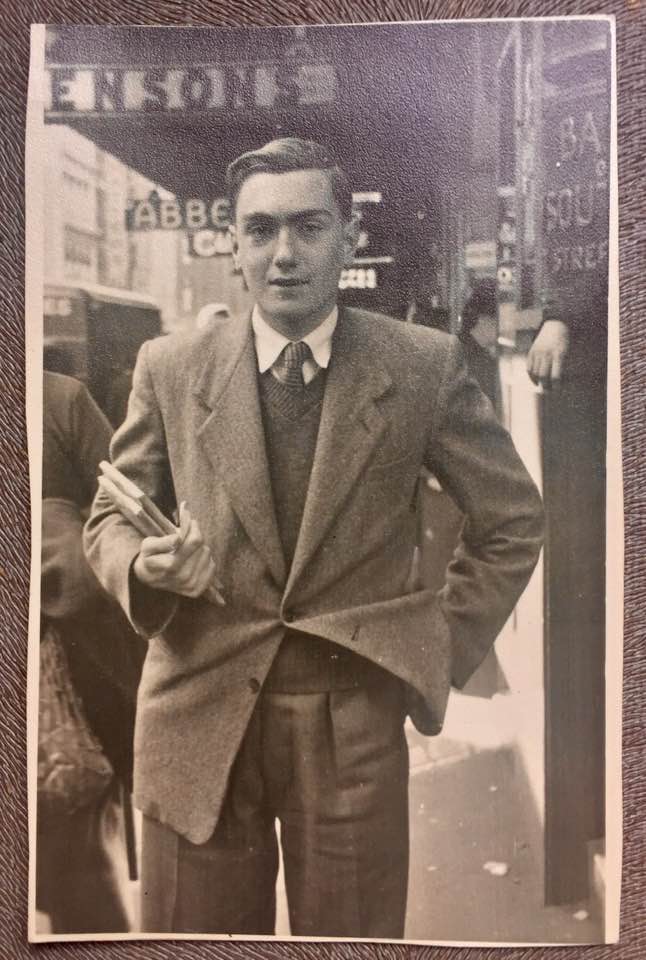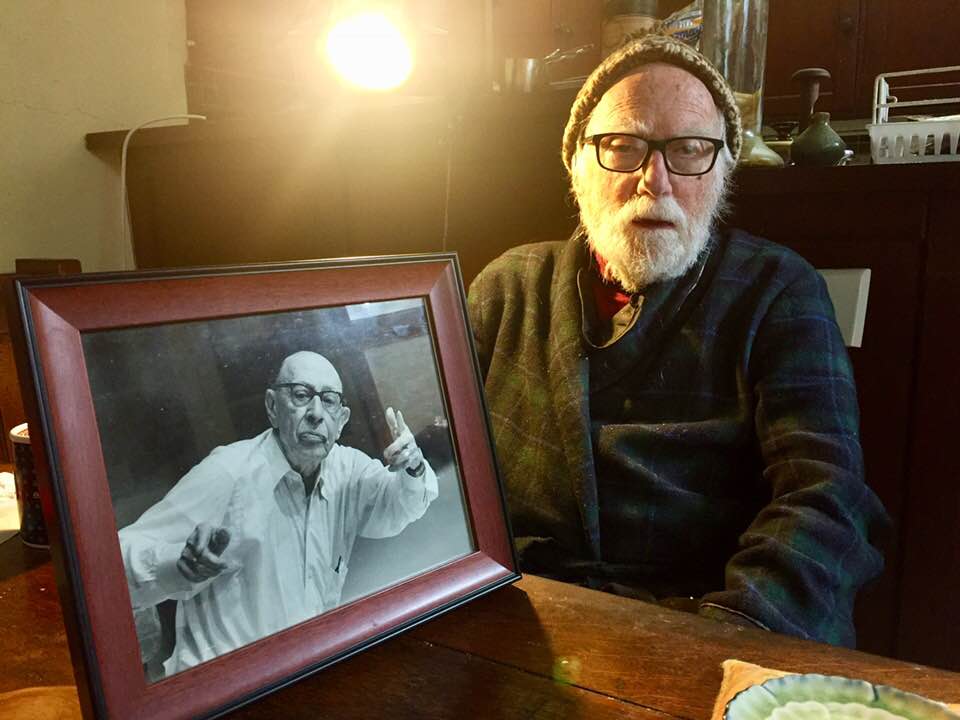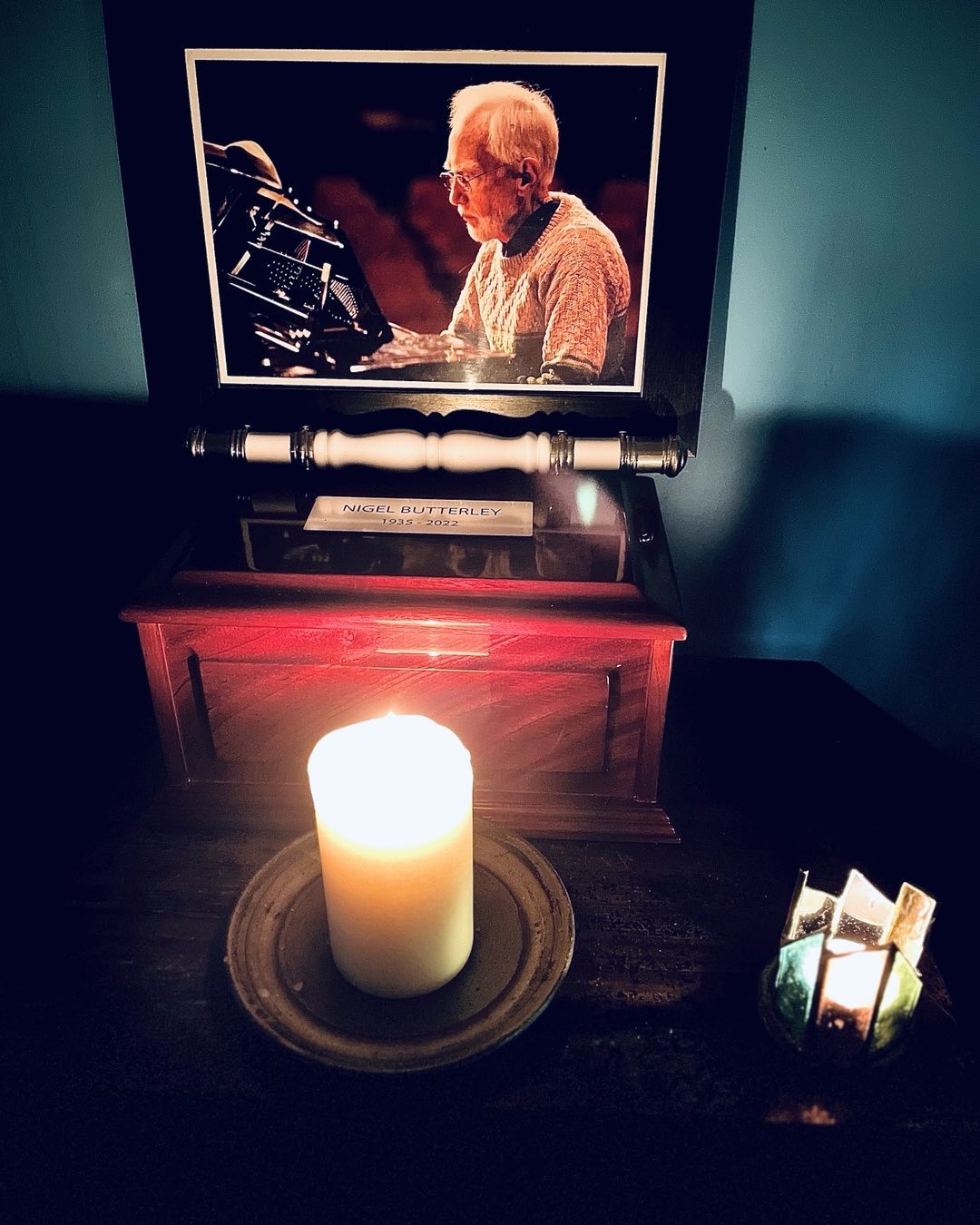7 May 2025
Remembering Nigel
 Image: Nigel Butterley performing ‘Sonatas and Interludes’ by John Cage, in Bundanoon.
Image: Nigel Butterley performing ‘Sonatas and Interludes’ by John Cage, in Bundanoon. © Unknown photographer, photo supplied by Tom Kennedy.
On May 13 this year, the composer Nigel Butterley (1935-2022) would have turned 90. Whatever you personally believe about what happens after life - we enter nature, we endure through love and the acts of love we've done on earth, or we pass through to some kind of spiritual 'beyond' - Nigel Butterley's artistic world gives voice to those deepest convictions about the big questions of being. His vision was vast, and it was as caring as it was careful, just as he was.
Having already written my own, partial and personal, introductory guide to Nigel's music for Nigel's 80th birthday, I decided to do something a little different this time. I have invited a number of performers and composers who have had relationships with Nigel's music or Nigel himself, to offer their thoughts, selecting particular pieces or memories to mark the occasion.
Composer and broadcaster Stephen
Adams, still remembers hearing Nigel's music for the first
time, on an LP - possibly at the AMC itself. Of
Meditations of Thomas Traherne (1968), written by Nigel
upon receiving the
Albert Maggs Award, Stephen said:
"…Hearing it for the first time was such an incredible
ecstatic experience!
I remember being enthralled by the richness of the musical
colours of the piece, and its sense of shifting eddies and surges
of darkness and light. The light most strikingly evoked by those
sudden bursts of a children's recorder chorus.
… how wonderfully strange and fresh that sound world felt
bursting into the orchestral sound world, very much as if a door
had suddenly opened in the heavens, letting in a sudden powerful
shift of light.
Meditations is a piece I still love, and have fond memories
also of playing it to my children 30 years later and seeing them
experience a similar sense of wonder on hearing it."
About the starkly contrasting Explorations (1970),
"perhaps Butterley's boldest and most confronting achievement"
(Gyger 2015, p.87), fellow composer and broadcaster, Andrew Ford, has a similarly
enduring recollection:
"I find there's often something compelling about Nigel's
music, something (it's hard to say what) that grabs my attention
and won't let go. The first time I experienced this phenomenon
would have been 40 years ago, shortly after I arrived in
Australia. I was driving in Sydney when Explorations came on the
radio. I missed the introductory announcement but was immediately
grabbed by the music. Reaching my destination, I sat in the car
on a suburban street until it was over and I learnt what it was.
It's a vivid memory."

[Photo by Tom Kennedy of a photo by Noreen Butterley]
Performer, artistic director, and educator, Jenny Duck-Chong says that Nigel was a
"musician's musician" who possessed a "deft understated command
of his forces in every work" she experienced, a music "full of
subtle nuances, shades and timbres", that showed "a deep
appreciation of the voice and its ability to shape music with
both colour and meaning."
Amidst many years of involvement with Nigel's music - including
Halcyon's
commissioning what would become Nigel's final completed work
Nature Changes at the Speed of Life (2014) - Duck-Chong
remembers Orphei
Mysteria (2008), another Halcyon commission, as "utterly
beautiful, austere and mellifluous":
"... Even now I can vividly hear certain sections of the
piece, where he drew together the sonorities of voice and
ensemble so expressively, evoking the drama of the
text."
The work was, however, not without technical challenges:
"…Thankfully we had been singing together for almost two
decades at this point and knew each other so well we could pull
this off (even as we exited to either side of the stage in the
epilogue with our backs to each other). This ritualistic exit, as
we departed into stillness, was, as so much of Nigel's music,
captivating in its unassuming simplicity. But there was nothing
simple in its inspiration or execution. It was finely wrought
craft."
Two other exceptional performers, Stephanie McCallum and Zubin
Kanga, single out Nigel's solo piano piece Uttering Joyous
Leaves - one of many pieces Nigel dedicated to his partner
Tom - for special mention:
"I have a great affection for Nigel's piano
piece, Uttering Joyous Leaves (1981), and feel it was one of the
best ones to emerge from the Sydney Piano competition commissions
over the decades. I included it in a very well-received recital
in Wigmore Hall as a London premiere in, I think, 1986 before
moving back to Australia. I have also had many students enjoy
learning it for student recitals. The piece remains unique in
quality of texture, rhythmic structure and upward floating
intensity, and the prefatory poetic reference is
inspirational." - Stephanie McCallum
"A career highlight for me was performing as part of Nigel
Butterley's 80th Birthday Concert in 2015. The concert featured a
new piano concerto by Elliott Gyger, From Joyous Leaves,
which I performed with Arcko Symphonic Ensemble and conductor Tim
Phillips. The concerto featured many different references and
tributes to Nigel, including the gradual introduction of prepared
piano sounds (referencing Nigel's Australian premiere
performances of John Cage's Sonatas and Interludes) as
well as musical references to his solo piano work, Uttering
Joyous Leaves.
I also performed Nigel's Uttering Joyous Leaves at
this concert, and this was such an extraordinary piece to perform
and interpret. Full of contrasting colours, from effervescent
passagework, to sparkling crystalline chords, to dark, skipping
basslines, the work was a joy to play. It's a high point of the
Australian piano repertoire, and a work I continue to recommend
to pianists." - Zubin
Kanga
Timothy
Phillips described the same concert as one of his "proudest
moments as a musician":
"… a spectacular concert that featured In the Head the
Fire, a new commission of Elliott Gyger's: From Joyous
Leaves and Nigel's monumental From Sorrowing Earth.
Already in the early stages of Alzheimers Nigel was perplexed
when taking his bow that the orchestra was playing happy
birthday to him. I wish his music could be heard more frequently
and by a wider audience as Nigel, a true gentleman, was one of
our most original and unique voices."
Timothy developed "a deep appreciation" for Nigel's music over
the years and was also "proud to say a deep and mutually
respectful friendship" with Nigel and his partner Tom. When
returning to Australia in the early 2000s, "possessed by a vision
that Australians should be performing and programming Australian
classical music", Phillips said Nigel's music was high on his
list and the group he founded, Arcko
Symphonic Ensemble, includes a number of additional works of
Nigel's amongst their repertoire:
The Canticle of David,
Laudes,
Forest I
and II , and
Three Whitman Songs.

[Photo by Tom Kennedy]
Conductor Bryan Griffiths
notes how audiences respond to his programming and championing of
one of Nigel's lesser known works, Pentad (1968):
"Since completing a critical edition of Pentad in
2017, it has always been received with warmth and fascination
wherever I've directed the work in performance, even-or perhaps
because-its modernist abstractions challenge received ideas of
what the wind band can be."
Griffiths still recalls "the first thrill" of discovering the
manuscript of Pentad on the shelves of the Sydney
Conservatorium library, "an autographed masterpiece of modernist
music for wind and brass shelved humbly among the general
catalogue, composed by one of our greatest."
Written in 1968, the same year as Meditations of Thomas
Traherne, Elliott Gyger describes the music of
Pentad as "bold, abstract and ritualistic, as far
removed as possible from Meditations of Thomas
Traherne's numinous mystery" (Gyger 2015, p.97).
Elliott Gyger's book on Nigel's music (Gyger 2015) is an
invaluable resource, balancing rigorous analysis with contextual
and poetic insight. Reflecting, a decade after its publication,
Elliot had this to say:
"Writing about Butterley's music has brought me into close
contact with pretty much everything he wrote, but the pieces
which I know most deeply are unsurprisingly those which I have
performed, as a choral singer. With Sydney group the Contemporary
Singers, I sang Flower in the crannied wall - a luminous
short motet, with plainchant-derived diatonic clusters supporting
an elegant melodic line passed from voice to voice - and the
virtuosic Emily Dickinson cycle There Came a Wind Like a
Bugle, written for the Song Company. These two pieces taught
me an enormous amount about composing for unaccompanied voices;
at the time there was little if anything in the Australian choral
repertoire to match their level of textural invention. They are
also beautiful, succinct and flexible responses to striking
poetry, with an unerring sense for apt word-setting, and
interestingly almost no text repetition.
Similar qualities were to reappear a few years later, on a
much grander scale, in the wonderful choral-orchestral Spell
of Creation - a work which I can claim to know in more detail
than any other Butterley work simply by virtue of having typeset
it, and preparing the parts and piano reduction for the
premiere. Spell of Creation tackles profound themes of
faith and doubt: the former via mystical religious texts from
diverse traditions, and the latter in the poetry of Kathleen
Raine, which was so central to Butterley's later music. The score
encompasses extremes of complexity and transparency, including
ecstatic Hildegard settings tossed back and forth between
antiphonal choirs of voices and brass, orchestral textures of
shimmering beauty under deeply moving solos for soprano and
baritone, and an ending of riddling mystery. Singing in the
premiere performance in 2001 was an incredibly rewarding
experience, hearing the masterly imagination of every moment
contribute to a compelling overall vision. Described by Sydney
Morning Herald critic Peter McCallum as 'possibly the most
important choral work yet written in this country', Spell of
Creation has yet to receive a second performance."
I'm particularly pleased to have invited others to share their
thoughts for this article because it not only created a
reflection of the music that I simply could not have made alone,
but the process also reminded me of the unique pleasure of
mentioning Nigel to those who knew him or knew of him. You
immediately feel the generosity Nigel put into the world,
returned.
Nigel's close friend, the composer and teacher
Robert Smallwood sums this up perfectly:
"Even so many years later I still recall the pleasure of
meeting Nigel for the first time. The surprise was that such
wonderfully assured writing came from someone so genuinely
modest. I did not imagine then that our meeting would lead to a
lifelong friendship of more than 40 years.
…I last saw Nigel in January 2022 in a nursing home in
Stanmore, not far from his home. Dementia had taken his memory
from him. Although he could not remember me, he enjoyed telling
the staff that I was his lifelong friend. His musical memory was
still powerful, as he sang and recalled Rachmaninoff
preludes.
…Nigel's music favours intricate, even elusive gestures. It
invites listeners to join, examine and penetrate. It does not
present its ideas overtly or simply. The listener is rewarded
upon repeated listening as its depth and layers unfold and reveal
themselves."
Those revelations continue, and endure.

[Photo by Tom Kennedy]
References
Gyger, E. (2015). The Music of Nigel Butterley. Melbourne:
Wildbird Music.
© Australian Music Centre (2025) — Permission must be obtained from the AMC if you wish to reproduce this article either online or in print.
Subjects discussed by this article:
- Nigel Butterley
- Robert Smallwood (Interviewee)
- Timothy Phillips (Interviewee)
- Bryan Griffiths (Interviewee)
- Stephen Adams (Interviewee)
- Andrew Ford (Interviewee)
- Jenny Duck-Chong (Interviewee)
- Stephanie McCallum (Interviewee)
- Zubin Kanga (Interviewee)
- Butterley, Nigel
Composer Chris Williams was mentored by Nigel Butterley for a number of years and also worked as his musical assistant. He is currently pursuing doctoral studies in the United States of America as a composition candidate at Duke University. His music has been performed by the Flinders Quartet, The Song Company, the Tasmanian and Melbourne Symphony Orchestras, amongst others, and has been heard at Carnegie Hall.
Comments
Be the first to share add your thoughts and opinions in response to this article.
You must login to post a comment.